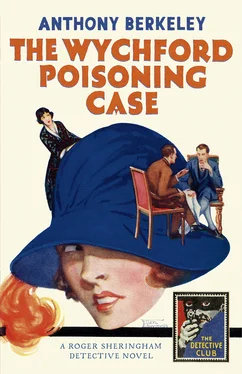‘You’ve got to remember that there wasn’t any suspicion of murder raised at all till Mary Blower told Mrs Saunderson about the fly-papers.’
‘Alec,’ said Roger with warm approval, ‘you’re showing a most commendable grasp of this case. Yes, that is so. And what a tremendous lot depended on that chance communication! If Mary Blower had never said a word, it’s my opinion that we should never have heard of the Wychford Poisoning Case at all. Just think! Mary Blower herself wouldn’t have handed that letter to Mrs Allen and that particular complication would never have come out; brother Alfred wouldn’t have been telegraphed for and taken control of the whole business; the doctors wouldn’t have been put on the qui vive ; the bottle of Bovril wouldn’t have been analysed; there would have been no search made after the death. You’re right—there wouldn’t even have been a doubt about the death at all. If Mary Blower hadn’t been smitten by fortuitous desire for self-importance, the doctors would almost certainly have given a certificate for death from gastroenteritis!’
‘Gastroenteritis?’
‘Yes, acute dyspepsia; which they’d already diagnosed, you remember.’
‘They might have done that even if the man had been poisoned by arsenic?’
Roger took a pull at the tankard which, together with another for Alec, he had prudently ordered before that gentleman’s arrival.
‘I see,’ he said, ‘that if you’re to get a proper understanding of this case I shall have to give you a short lecture upon arsenical poisoning. What you’ve got to realise is, to put it loosely, that death from poisoning by arsenic is death by gastroenteritis. The poison arsenic kills by setting up gastroenteritis, just as any other violent irritant might—ground-glass, to take a particularly vigorous example. Without being too technical, it ploughs up the coating of the stomach. That is gastroenteritis.’
‘Then if they’re the same thing, arsenical poisoning and gastroenteritis can’t be told apart? At a post-mortem, I mean, and without analysing the various organs.’
‘Well, to a certain extent they can. It would be more true to say that arsenic sets up a special form of gastroenteritis; the symptoms are a little different from the ordinary form of it. There are distinctive ones in arsenical poisoning (I believe the number recognised is twenty), such as the violent and prolonged vomiting and the acute pains in the legs mentioned in Bentley’s case, which aren’t usually found in ordinary gastroenteritis, but the whole thing is very anomalous and the dividing line extraordinarily fine.’
‘Then that’s why so many poisoners use arsenic? Because unless suspicion does happen to be raised, it’s so jolly easy to get away with?’
‘Without a doubt. And also because it’s so easy to obtain. The ordinary doctor isn’t on the look out for arsenical poisoning, you see. Probably not one in a hundred ever meets a case in his whole life. When he has to treat a perfectly legitimate case of gastroenteritis, as he thinks, and the patient just happens to die instead of recovering, he doesn’t hesitate to give a certificate. It never occurs to him not to. Why should it? But I’d bet a very large amount of money that a positively staggering number of those cases of innocent gastroenteritis would have turned out to be arsenical poisoning if only they’d been followed up.’
‘Horrid thought! A staggering percentage?
‘Well, half of half of one per cent, would be staggering enough in the aggregate, you know. Why, just look at some of the cases that have been brought to light recently by the merest possible chance. Seddon! It was the nearest thing imaginable that he was never found out. The certificate had been given and the body even buried. Armstrong again. One could go on for hours.’
‘What a devil of a lot you seem to know about all this!’ Alec observed, with as near an approach to admiration as he had yet shown.
‘I do,’ Roger agreed. ‘Since we stayed at Layton Court together a couple of years ago, as you may remember, Alexander, what I haven’t read up on this subject hasn’t only not been worth reading, it hasn’t even been written. In fact,’ he added candidly, ‘I shouldn’t be at all surprised if I don’t know a trifle more about criminology than any man living.’
‘You’ll be able to write a detective story then,’ Alec suggested brightly. ‘In the meantime, what about going up and getting ready for dinner? It’s nearly seven o’clock.’
CHAPTER VI
INTRODUCING MISS PUREFOY
MRS PUREFOY was a pleasant little person with hair just beginning to go grey and a jolly smile. Roger took a liking to her at first sight, while she was at no pains to hide her gratification in welcoming so distinguished a guest.
‘I’ve read all your books, Mr Sheringham,’ she said at once as she shook hands with him. ‘Every single one!’
Roger was never in the least embarrassed by this sort of thing. ‘Well, I hope you enjoyed reading them more than I did the writing of them, Mrs Purefoy,’ he said easily.
‘Does that mean you didn’t enjoy writing them? I thought you novelists were only really happy when you’d got a pen in your hands.’
‘Somebody’s been misinforming you,’ Roger replied with a grave face. ‘If I can speak for the tribe, we’re only really happy when we’ve got a pen out of our hands.’ As far as Roger was concerned, this was perfectly untrue; he had to write, or explode. But he had an intense dislike for the glib talk about self-expression indulged in by so many second-rate writers who take themselves and their work a good deal too seriously, and put it down to posing of the most insufferable description. That his own anxiety not to emulate these gentry had driven him into no less of a pose of his own, in the precisely opposite direction, had curiously enough never occurred to him.
‘But this is most devastating! You’re shattering all my most cherished illusions. Don’t you write for the joy of writing, then?’
‘Alas, Mrs Purefoy, I see I can hide nothing from you. I don’t! I write for a living. There may be people who do the other thing (I have heard rumours about them), but believe me, they’re very rare and delicate birds.’
‘Well, you’re candid at any rate,’ Mrs Purefoy smiled.
‘Roger’s got a hobby all right, Molly,’ Alec put in, ‘and it’s got plenty to do with words; but it isn’t writing.’
‘Oh? What is it, then, Alec?’
‘You’ll have found out before dinner’s over,’ Alec replied cryptically.
‘What he means is that I won’t let him monopolise the conversation all the time, Mrs Purefoy.’
Mrs Purefoy looked from one to the other. ‘I suppose I’m very dense, but this is beyond me.’
‘I think Alec is hinting that I talk too much,’ Roger explained.
‘Oh, is that all? Well, I’m very glad to hear it. I like listening to somebody who can talk.’
‘You hear that, Alec?’ Roger grinned. ‘I’m going to be appreciated at last.’
The conversation was interrupted by the entrance of a dark, shingled maiden, in a pale green dinner-frock.
‘My eldest daughter,’ Mrs Purefoy announced with maternal pride. ‘Sheila, dear, this is Mr Sheringham.’
‘How de do?’ said the dark, shingled maiden languidly. ‘You’re the great Roger Sheringham? Read some of your books. Topping. Hallo, Alec, old hoss. Dinner nearly ready, mum?’
‘In a few minutes, dear. We’re waiting for father.’
‘Well, need we wait for him on our feet? What about sitting down to it?’ And she collapsed wearily into the largest chair in the room.
Alec pulled one up beside it, and they embarked immediately on a discussion of the Gentlemen and Players match then in progress at Lord’s. Roger sat down beside his hostess on a chesterfield couch.
Читать дальше











